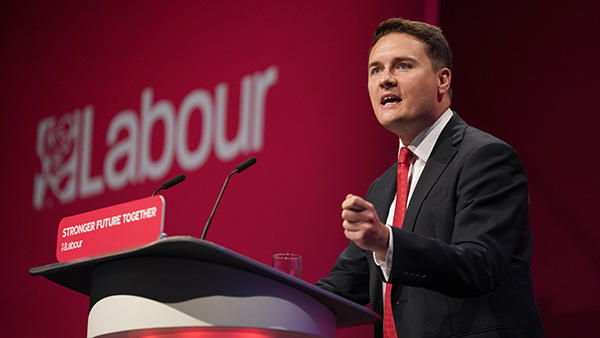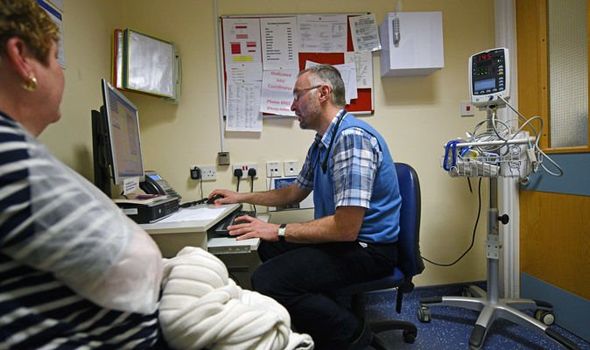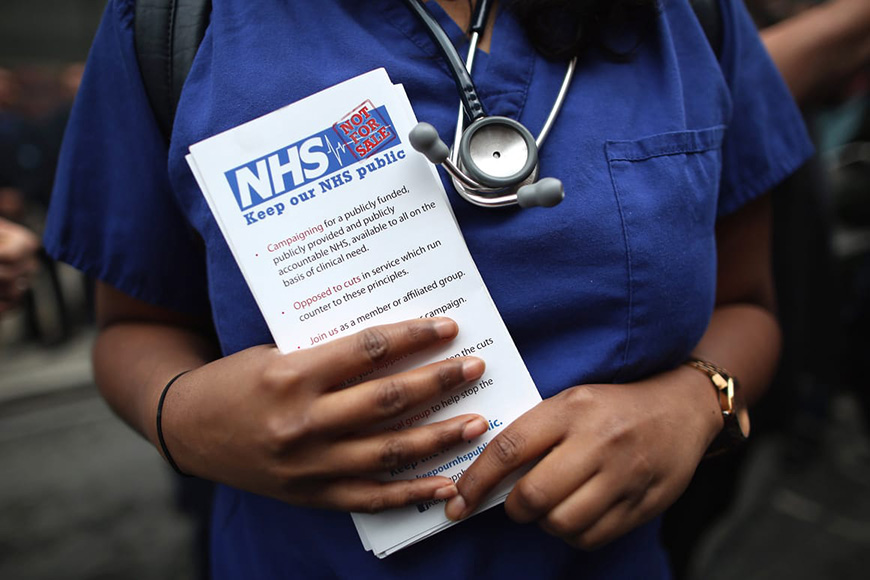
Keep Our NHS Public is scrutinising the NHS news coming from the major political parties this conference season and hoping to see the kind of policy we believe is needed to save our NHS. So far, we have been underwhelmed by what is being proposed.
It was reported by Pulse (the UK’s leading outlet for news relating to general practice) that shadow health secretary Wes Streeting has said that ‘any available funding’ under a Labour Government would go to primary care and other non-acute sectors. He went on to say,
‘I’ve already made it very clear to the acutes that as additional resources become available, the first port of call on those resources will be mental health, primary care, community care, social care – because that’s how we get better outcomes for patients and better outcomes for taxpayers’ money.’
Should GPs be welcoming this news? We don’t think so. All the sectors Streeting mentions need additional funding. While it is absolutely true that General Practice, mental health services and social care are in desperate need of more funding, GPs want to see their patients getting the care they need, and to do that, hospital services must be properly funded too. The NHS as a whole, is now dealing with the dire consequences of over a decade of severe underfunding – underfunding which is unnecessary, unacceptable and damaging to society at large, as detailed in the recent report by the 99% campaign, ‘The Rational Policy-Makers Guide to the NHS’. As this report makes clear, ‘if you starve a racehorse it is no good blaming the horse and ignoring the diet when it fails to perform’.

As a result, no-one can look at the scenes in A&E where acutely ill patients are kept for hours in ambulances meters away from life-saving care, lying in corridors because there is no bed for them, the lack of vital staff and equipment, or look at the long waiting lists for elective treatment, and make the case that the hospital sector doesn’t need funding just as urgently as any other sector.
Streeting’s proposal, is woefully inadequate, and seems sadly in keeping with the Conservative Party’s repeated claims that the NHS is a funding black hole we can no longer afford to maintain without help from the private sector. We’ve debunked this ideological falsehood, and we hoped for better from the Labour Party.
Most patients who seek emergency care aren’t there because of lack of GPs. They’re there because they have conditions that GPs can’t deal with, conditions that need the special resources and skills of hospital services. Keep Our NHS Public’s Dr Louise Irvine, who has worked in General Practice for decades said:
‘I need to know that I can get my patients seen promptly and effectively whether they have an emergency condition such as a stroke, appendicitis or ectopic pregnancy, an urgent condition such as a possible cancer, or a painful disabling condition such as severe hip arthritis requiring a hip replacement. Understaffed, under-resourced hospital services mean my patients wait longer for the care they need. Not only does that mean they suffer, but it also adds to the burden on general practice as we have to manage these patients’ ongoing conditions, including their pain and anxiety while they wait. As a GP I don’t think we should be ‘robbing Peter to pay Paul’. It makes no sense economically, and most importantly, it makes no sense for our patients.’

Furthermore, while there is a logic in thinking that investing in primary care and prevention will reduce the need for hospital intervention, this cannot be obtained simply by starving secondary care. In fact, there is going to be an increased need for hospital beds over the next few decades, as the population ages and demand continues to grow. At best, improved primary and social care will reduce the degree of increase that is required but will not mean we can ever plan to reduce hospital provision from its current low point.
Even with the best primary care in the world, people will continue to become unwell with problems that need hospital treatment – that’s why we have hospitals in the first place.
The projection is that this need will grow over time because of demographic changes and GPs can’t do hip replacements, treat heart attacks, provide cancer treatment and so on.
As part of a long term plan involving increased funding for all sectors of health care Keep Our NHS Public has no objection to primary care having a bigger percentage of the total NHS budget allocated to it, but that would need to be a bigger share of an overall bigger budget that also meets the needs of the hospital sector. A safe and successful national health service is based on strong primary and community services working in partnership, not competition, with well-funded and effective hospital and mental health services. We cannot have one without the other. And in fact, good community services may paradoxically increase the admissions to hospital as they uncover unmet need and neglect. We need a vision for a comprehensive health service, not short term fixes that fail to address the population’s needs.
Taking from one under resourced area to give to another is not a convincing strategy, especially while the current waiting list of 7.7million is mainly to do with hospital provision and the service wide staffing crisis anyway.

We are also concerned about Streeting’s statements today that it will take Labour two terms in office to turn around the ‘existential’ challenges faced by the NHS and social care. While we recognise that the damage done by the current Conservative Government will take some time to repair, this doesn’t speak of the urgency we believe is required to save our NHS and save lives. Streeting has also said the challenges facing the NHS in England were ‘enormous’ and without significant reform ‘it isn’t sustainable for the long term’. What is troubling is that by all indications, Streeting believes this ‘significant reform’ will have to involve the private sector. We believe this is simply wrong.
Streeting also told a conference fringe event, that there was too much ‘sentimentality’ about the NHS, saying ‘If people want a shrine, sign up to a religion. The NHS is a public service and it’s one that is failing far too many people’. Again, his reference to the NHS as a religion echoes the derogatory comments of Conservative politicians and right-wing commentators who then go on to argue for privatisation of services as the only rational way forward.
We do, however, agree that the NHS is failing too many people, but this is because of the devastating de-funding and insidious spread of privatisation in the NHS, not because of the impossibility of sustaining investment, or a fundamental flaw in the NHS model. This is ideological nonsense. The model of the NHS, based on the founding principles of universal care, public ownership, management, and accountability, has for decades provided one of the best health care services in the world. It is the undermining of these principles that has led us into the crisis we are now facing.
In fact, investment in the NHS is good for both health care outcomes and for the economy. And it isn’t just us that says so. The 99% campaign’s report makes the case in detail, but recent articles on a wide range of platforms agree with us too. See NHS Confederation, New Statesman, even the Financial Times.
Keep Our NHS Public isn’t sentimental about the NHS, but we are willing to fight for our vision for a people’s NHS, because if we do, it can deliver first class health care for all, and improved outcomes for society at large. Surely there is little as urgent as that.
